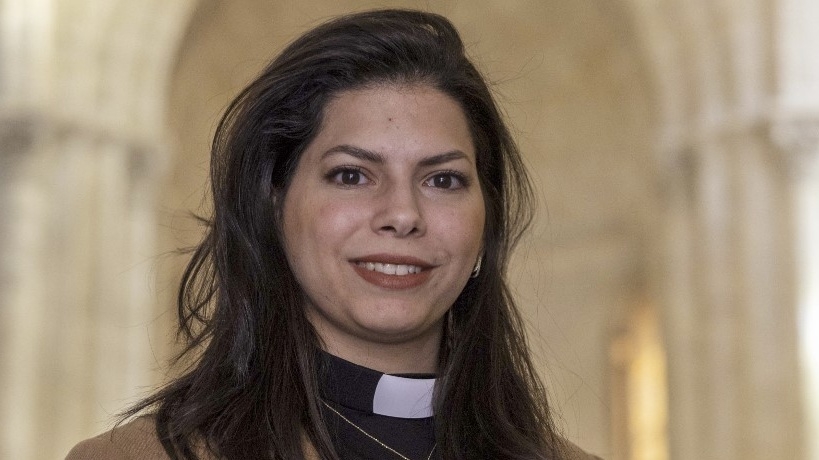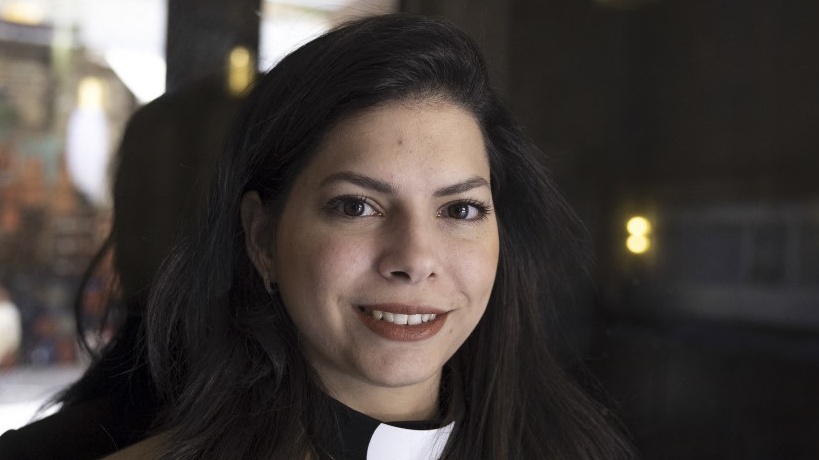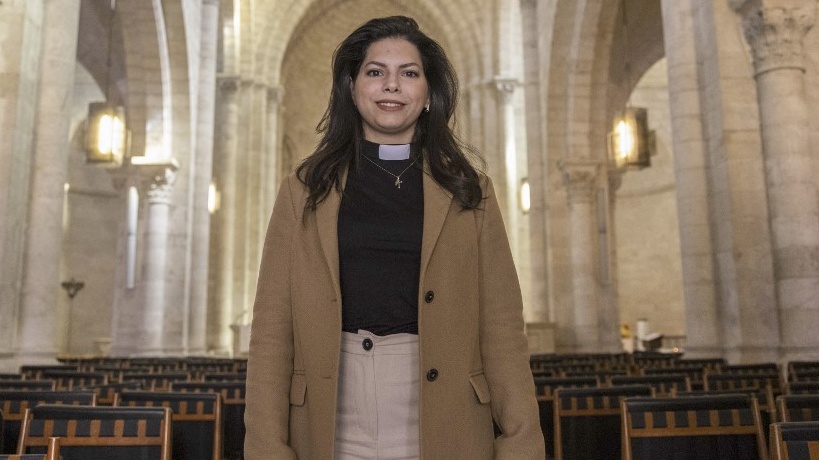Jerusalem’s first female pastor on equality, Israeli occupation, and her new role

Growing up, Sally Azar would often accompany her father to the Church of Jerusalem as well as attend meetings and bible study sessions.
Her father, a former pastor and a current bishop at the Lutheran Church, would bring Azar with him to help out at summer schools or youth work, which helped inspire her interest in theology.
Now, at age 26, Azar has become the first Palestinian female pastor in the Old City of Jerusalem. She was ordained in a Lutheran Church ceremony earlier this year, and will head the English-speaking congregation at the Church of the Redeemer, the Evangelical Lutheran Church in Jordan and the Holy Land.
Her new role will include performing all the duties of a pastor during congregations, from weddings and baptisms to leading services. She will also continue her work with the justice office, youth initiatives, and gender justice.
The news has made headlines around the world, as most Palestinian Christians belong to denominations that do not allow female clergy, making Azar’s appointment a rare occasion that has been widely celebrated in the region.
New MEE newsletter: Jerusalem Dispatch
Sign up to get the latest insights and analysis on Israel-Palestine, alongside Turkey Unpacked and other MEE newsletters
Fighting for equality
Azar was born and raised in Jerusalem, but travelled to Germany where she studied intercultural theology. She also spent two years in Berlin undertaking an internship in a church.
Overall, she estimates that she spent around eight years studying before she was ordained.
Her new role has inspired many women around her.
“I even had some Muslim friends of mine come to the Old City to see the appointment… it’s generally been a positive atmosphere,” she told Middle East Eye.
However, her ordination was not met with enthusiasm by everyone.
“Some churches were against it, and some priests congratulated me unofficially, they couldn’t do it publicly because their churches won’t support it,” she explained.
As well as studying for her new role, Azar has been vocal about the importance of having women leaders in churches.
“We have been making changes to things like our Lutheran church’s general justice policy, we are fighting for equality,” she says.
“Now that I’m a pastor, I realise how important it is in Palestine, which is why so many women have been writing to me. I’m so proud of it because it’s a big step for women,” she added.
Azar says she hopes that society becomes more accepting of women serving as leaders in a variety of other churches, as well as in other settings, such as the workplace.
Checkpoints and challenges
Returning back to Jerusalem after spending years living in Germany was a shock for Azar.
She found herself having to get used to the tense situation on the ground and the restrictions and challenges imposed by the Israeli occupation.
“Right now, things are getting worse. I am aware that many of the members of our congregation are concerned and are debating whether it is safe to visit particular locations,” she says.
Although congregation members have found ways to deal with these challenges, Azar believes that they can still cause significant problems.
'Both Palestinians in Jerusalem and those in the West Bank who live behind the wall are affected by the occupation in their day-to-day lives'
- Sally Azar, pastor
“Both Palestinians in Jerusalem and those in the West Bank who live behind the wall are affected by the occupation in their day-to-day lives,” she says.
One of their biggest challenges is getting permission for congregation members travelling to Jerusalem to cross checkpoints in order to gather together in workshops.
“We have to take so many things into consideration when planning to meet in Jerusalem or Bethlehem with the whole congregation.”
The daily challenges posed by long delays and complicated processes at checkpoints becomes tiring, especially during Christmas and Easter, she explains.
This year, Ramadan, Easter, and Passover are set to fall at around the same time of year, which will bring thousands of people to Jerusalem.
“There hasn’t been a year where Israeli forces haven’t clashed or set up checkpoints to prevent people from entering, there’s always conflict, so I hope we can resolve it amicably with kindness,” she says.
Despite this situation, Azar is hopeful that the churches will continue to work together to support those affected by the Israeli occupation.
Making women’s voices heard
Azar says that one of her overarching goals is to make sure women’s voices are heard more in the church.
By engaging and working alongside women, she believes her new role will give her the power to have more influence.
“I believe that more women will come to me as a woman pastor to report things such as violent behaviour, and this will in turn mean that it is spoken more about in society,” she explains, describing how it may be more difficult for a woman to approach a male pastor about some of her experiences.
She also hopes that her appointment will pave the way for more women to take on similar roles within churches, paving the way for things to change in Palestine and around the region.
Azar is now one of five ordained women in the Middle East and north Africa region, alongside one in Syria and three in Lebanon.
This article is available in French on Middle East Eye French edition.
Middle East Eye delivers independent and unrivalled coverage and analysis of the Middle East, North Africa and beyond. To learn more about republishing this content and the associated fees, please fill out this form. More about MEE can be found here.






